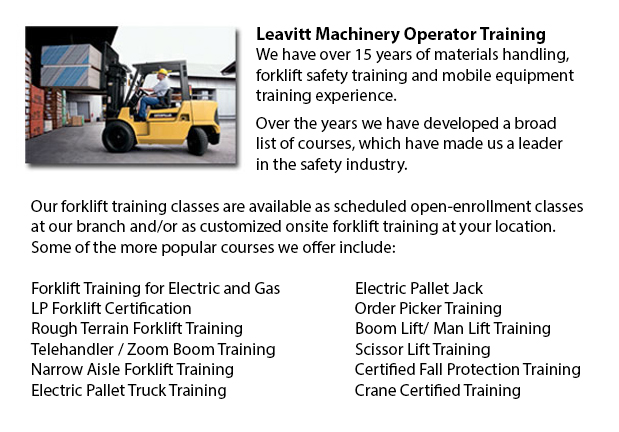
Edmonton Forklift License - Getting a forklift license or forklift certification within North America would require the trainee to perform hands-on training in addition to classroom instruction. The state, provincial and federal regulatory bodies are responsible for the licensing, certification and training for powered industrial truck operators. Operators could get a license either through training administered by the employer or by a third party. In any case, regulatory requirements need to be met. Recertification is necessary every two to three years.
Forklifts are powered industrial trucks that come with a variety of options, such as sit-down and stand-up. There are different types and sizes of forklift suitable for different industrial applications. Operator training courses are usually individualized to deal with the specific uses and kinds for which the operator is training. Training on a gas-powered, sit-down lift truck in a warehouse surroundings will not be the same as training on a stand-up, propane-powered forklift in a shipyard. The variety of forklifts and their uses makes it impossible to establish universal licensing requirements for all businesses and machinery. Regulatory standards, hence, tend not to focus on particular course requirements but instead on the outcome of individual training programs.
On the job training that is offered by the employer is the most common way of forklift training certification and licensing. The employer who offers this method of certification is required to offer practical training and classroom sessions on equipment at their place of work. Employers could opt to train staff on every type of forklift separately, or to train them on all equipment combined. The curriculum incorporates lift truck operation procedures, company rules, forklift maintenance and safety measures. Topics specific to the worksite, such as hazardous materials or conditions, should be included. Following classroom learning, operators are taught how to safely use and operate each type of forklift on the worksite.
Certification through a third-party vendor usually requires an on-site component along with hands-on practice.
Usually, an employer-provided certification will not transfer from the current employer to the next employer. Acquiring a forklift license through employer-provided training enables the operator to operate a forklift for that particular employer only.
The most important factor of forklift license training is forklift safety. The exact safety training requirements vary from one type of machine to another. Safety issues differ from industry to industry and from employer to employer. Both third-party providers and employer-provided training might have to address extra requirements for safety training in applicable industries, such as in marine and offshore operations.
-
Narrow Aisle Forklift, Order Picker, Electric Pallet Jack, Electric Pallet Truck Certification in Edmonton
A pallet haul is a device built in particular for moving pallets of differing weights and sizes. They might be utilized in conjunction with cranes, lift trucks and other heavy duty machinery as an accessory piece or to be used on their own. Pallet ho... More -
Edmonton Zoom Boom Ticket
Edmonton Zoom Boom Ticket - Zoom Boom Training is designed to train operators on variable reach forklifts. The goals of the training are to impart an understanding of the physics of the machine, and to be able to outline the operator's tasks. This pr... More -
Edmonton Counterbalance Forklift Training
Edmonton Counterbalance Forklift Training - Counterbalance Forklift Training courses are always in high demand. The Counterbalance forklift is a forklift that is made together with a weight that counters the balance, equally distributing the weight o... More -
Edmonton Crane Safety Training
Edmonton Crane Safety Training - Businesses and crane operators must know the issues related to crane safety. Legislation provides rules for the safe operation, inspection and maintenance of lifting machinery all around North America. Crane Safety co... More -
Edmonton Counterbalance Forklift License
Edmonton Counterbalance Forklift License - Forklifts, when operated by completely trained personnel, are a major asset to businesses. We provide a comprehensive training program consisting of all aspects of operating a powered lift equipment. Counter... More -
Edmonton Forklift Training Schools
Edmonton Forklift Training Schools - Why Forklift Training Schools Are Important To Your Business Are you searching for work as a forklift driver? Our regulatory-compliant mobile equipment operator training provides instruction in types of forklif... More -
Aerial Lift / Boom Lift / Man Lift / Scissor Lift Certification in Edmonton
Lift tables or also referred to as scissor lifts could raise both individuals and materials vertically. They are usually used in commercial, industrial and construction environments. Normally, the use of a scissor lift truck is to lift and lower supp... More -
Edmonton Heavy Equipment Operator Certification
Edmonton Heavy Equipment Operator Certification - The heavy equipment operator is a person who manipulates the controls and drives different kinds of large machines. Heavy machinery is most frequently used on construction sites to be able to deliver... More

Forklift Certification Edmonton
TOLL FREE: 1-888-254-6157
Edmonton, Alberta
forkliftcertificationedmonton.com
Email Us
About Us



